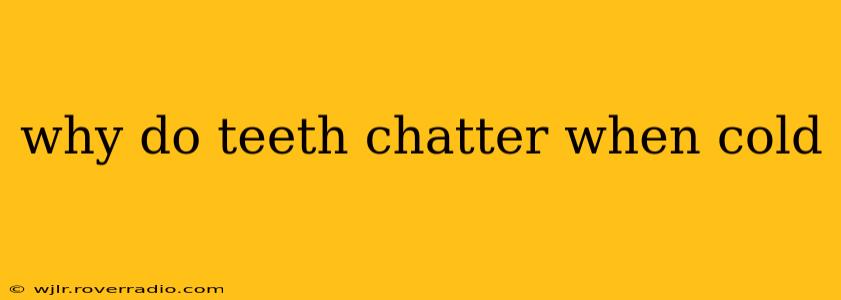Why Do Teeth Chatter When Cold? Understanding the Shivering Response
Teeth chattering, also known as chattering teeth or dental chattering, is a common involuntary response to cold temperatures. It's a fascinating example of how our body works to maintain its core temperature, even when faced with external chill. This article delves into the physiological mechanisms behind this involuntary reflex and explores some related questions.
What causes teeth chattering?
Teeth chattering is a form of shivering, a physiological response controlled by the hypothalamus, the part of the brain responsible for regulating body temperature. When exposed to cold, the hypothalamus detects a drop in core body temperature. To counteract this, it triggers a series of involuntary muscle contractions throughout the body, including the tiny muscles in the jaw. These rapid, rhythmic contractions are what cause your teeth to chatter.
The purpose of shivering is to generate heat through increased muscle activity. Think of it as your body's built-in furnace, working overtime to produce warmth and restore its optimal temperature. While it may seem like a minor reaction, shivering is a crucial survival mechanism, helping your body avoid hypothermia in extreme cold.
Why does it happen in my teeth specifically?
The jaw muscles are relatively small and easily stimulated. Because the jaw is close to the surface of the body and relatively exposed, it is more susceptible to experiencing temperature changes, making it a convenient site for the shivering response to manifest prominently. The chattering sound is simply the result of these small, rapid muscle contractions in the jaw causing your teeth to hit against each other.
Is teeth chattering a sign of illness?
In most cases, teeth chattering is simply a normal physiological response to cold. However, if it occurs frequently or without exposure to cold, it could be indicative of an underlying medical condition. This is especially true if accompanied by other symptoms such as fever, chills, or muscle weakness. These conditions may involve issues such as:
- Hypothyroidism: An underactive thyroid can lead to decreased metabolism, making it harder to regulate body temperature.
- Malnutrition: Lack of essential nutrients can affect your body's ability to regulate temperature and function properly.
- Neurological disorders: Certain neurological conditions can disrupt the body’s temperature control mechanisms.
If you experience frequent or unexplained teeth chattering, it's crucial to consult a doctor to rule out any potential health concerns.
Can anything be done to stop teeth chattering?
The most effective way to stop teeth chattering is to increase your body temperature. This can be achieved through several methods:
- Dress warmly: Wear layers of clothing, including a hat, gloves, and scarf, to insulate yourself from the cold.
- Seek warmth: Move to a warmer environment, such as indoors or near a source of heat.
- Consume warm beverages: Drinking warm tea, coffee, or soup can help raise your internal temperature.
- Physical activity: Gentle exercise can help generate internal body heat.
By addressing the underlying cause—the drop in body temperature—you can effectively stop the chattering.
Why does my body shiver?
As mentioned earlier, shivering, including teeth chattering, is a core mechanism for thermoregulation. Your body uses this involuntary muscle contraction to generate heat and maintain its optimal internal temperature when faced with cold environmental conditions. This is a fundamental survival mechanism.
What are the health risks associated with prolonged shivering?
Prolonged or uncontrolled shivering can lead to hypothermia if not addressed promptly. Hypothermia is a serious condition in which the body loses heat faster than it can produce it, leading to a dangerously low core body temperature. Symptoms include confusion, drowsiness, and loss of coordination. If you suspect hypothermia, immediate medical attention is crucial.
In conclusion, teeth chattering is a perfectly normal physiological reaction to cold. However, understanding its causes and potential associations with other health conditions can provide valuable insight into your overall well-being. If you have concerns, always consult with a healthcare professional.
